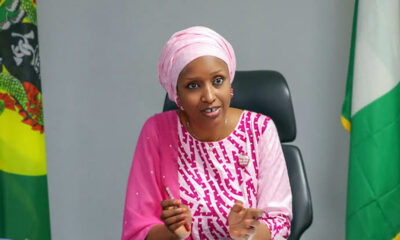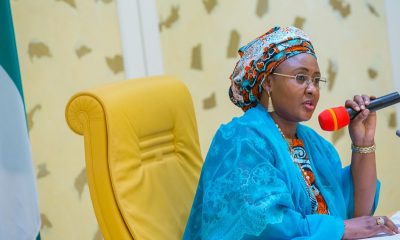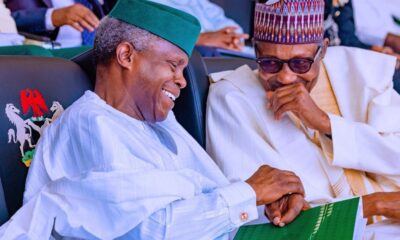News
Interview: We will not remove subsidy on fuel – Buhari
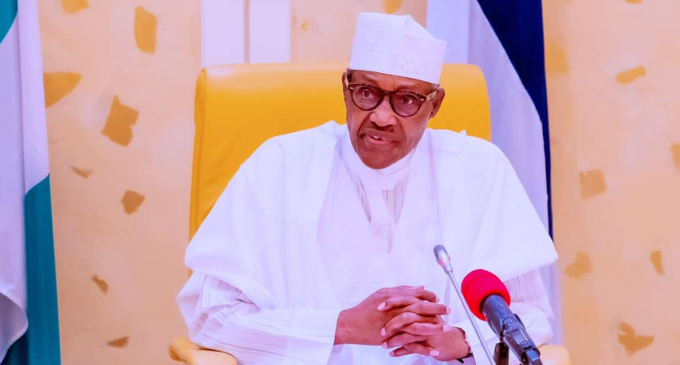
Below is the full, unedited text of Nigerian President, Muhammadu Buhari’s written responses to questions posed by Bloomberg News:
You campaigned for office with a pledge to fight corruption, secure the country and fix the economy. How would you rate your performance in fulfilling those pledges during your eight years in office? Why has insecurity been so hard to tackle? Are you making headway?
We leave Nigeria in a far better place than we found it. Corruption is less hidden for Nigerians feel empowered to report it without fear, while money is returned; terrorists no longer hold any territory in Nigeria, and their leaders are deceased, and vast infrastructure development sets the country on course for sustainable and equitable growth.
Security
In 2015, Boko Haram held territory the size of Belgium within the borders of Nigeria. Today they are close to extinct as a military force. The leader of ISWAP was eliminated by a Nigerian Airforce airstrike in March. The jets acquired from the US and intelligence shared by the British were not provided to previous administrations and stand as a testament to renewed trust re-built between Nigeria and our traditional Western allies under my government.
We urge those same international partners to take additional steps costing them nothing, by proscribing another group – IPOB – as a terrorist organisation. Their leadership enjoys haven in the West, broadcasting hate speech into Nigeria from London, spending millions lobbying members of the US Congress, and freely using international financial networks to arm agitators on the ground. This must stop.
My administration is the only one in Nigeria’s history to implement a solution to decades-long herder-farmer conflicts, exacerbated by desertification and demographic growth. The National Livestock Transformation Plan, putting ranching at its core, is the only way to deplete the competition for resources at the core of the clashes. Governors from some individual states have sought to play politics where ranches have been established, but where they have been disputes have dramatically reduced.
Economy
For years, we have been criticised by the likes of the FT, the Economist, and others for supposedly mistaken attempts to de-globalise and re-localise food production and boost manufacturing. Now with the war in Ukraine breaking global food supply chains “Davos Man” is in retreat as the energy crisis makes countries everywhere think again about energy independence and security.
We have spent our two terms investing heavily in the national road, rail, and transport infrastructure set to unleash growth, connect communities, and lessen inequality. This is structural transformation. It may not show on standard economic metrics now, but the results will be apparent in good time.
Corruption
Starting with our Whistleblowing Policy enacted in my first year in office hundreds of millions in stolen funds have been returned within Nigeria.
Working with our international partners, hundreds of millions of various currencies have been returned from abroad – primarily from the UK, US, and Switzerland – and used as social and welfare funds distributed directly to the poorest during the COVID-19 pandemic and the provision of long-delayed infrastructure-roads, bridges, rail, and power.
As an illustration, Monetary recoveries (January-December) 2021 show that more than N152 billion has been recovered. Dollar recoveries for the year amount to over USD 386 million; GBP, more than 1.1 million; Euro, about 157,000; Saudi Riyals about 1.7 million some more in Digital and other currencies.
Those partners refused to return these monies held for decades to previous Nigerian administrations in the certainty they would simply be re-stolen. They changed their approach with us because they knew my administration could be trusted.
Food inflation has risen by double digits since 2015, despite the government’s efforts to boost agricultural production. Why has your administration battled to counter pricing pressures? What will it take for Nigeria to achieve food security? How concerned are you about food shortages in Nigeria and the broader region, given the drought that it is currently experiencing?
We can only imagine what food inflation would be today had we not initiated organised programmes to boost domestic production. And still, we do not grow enough domestically.
“My government set in motion plans to remove the subsidy late last year. After further consultation with stakeholders, and as events unfolded this year, such a move became increasingly untenable.”
Initiatives such as the Nigeria Anchor Borrower’s programme, helping farmers compete against artificially lowered imports have boosted rice production to 9 million metric tonnes in 2021 from around 5.4 million metric tonnes in 2015. Even in the years of drought, rice production outstripped pre-2015 levels. Imports have fallen to near zero. We are making progress.
Against these advances, international trade remains rigged against food security in Africa. The EU’s policies in particular (see: It’s time for a new economic deal between the EU and Africa) are all rhetoric of open trade – yet their Common Agricultural Policy subsidy programmes and export of those subsidised goods create dependence, undermine Africa’s self-sufficiency, and cause food poverty and starvation.
If only out of enlightened self-interest the West – and particularly Europe – must step up. The moral if not economic case for doing so is unarguable. Do nothing, and more migrants from across the Sahel will attempt dangerous journeys to reachEurope.
Nigeria continues to confront electricity shortages, and your government has faced calls to modernise the grid or make the sector economical for stakeholders up and down the chain. Do you think you have done enough to address the nation’s energy shortfall? What else needs to be done?
First, we need more input. Our legislative framework has been a drag. The landmark PIA (see later answers) will bolster input, raise capital, and bring transparency to the system.
On grid modernisation, there are hundreds of ongoing projects and initiatives attracting funding from investors. Take my Presidential Power Initiative (PPI), a government-to-government initiative between the Governments of Nigeria and Germany, with Siemens AG, to upgrade the electricity grid with a $2 billion investment.
Once signed into law the constitutional amendment bill – recently voted through parliament – will allow state governments to generate and transmit their own electricity, further facilitating investor participation in our market and enabling states and local businesses to transmit excess supply to the grid.
We are also decentralising the national grid through renewable-driven mini-grids. The $550 million Nigeria Electrification Project has deployed more than 20,000 Standalone Solar Systems (SHS), as well as Solar Hybrid mini-grids in over 250 locations.
The IMF and World Bank and many leading economists have urged you for years to remove the fuel subsidy and unify the exchange rate. Why have you not heeded such calls?
Most western countries are today implementing fuel subsidies. Why would we remove ours now? What is good for the goose is good for the gander!
What our western allies are learning the hard way is what looks good on paper and the human consequences are two different things. My government set in motion plans to remove the subsidy late last year. After further consultation with stakeholders, and as events unfolded this year, such a move became increasingly untenable. Boosting internal production for refined products shall also help. Capacity is due to step up markedly later this year and next, as private players and modular refineries (Dangote Refinery, BUA Group Refinery, Waltersmith Refinery) come on board.
The exchange rate is still susceptible to external shocks that can suddenly and severely affect Nigerian citizens. As we step up domestic production – both in fuel (enabled by PIA) and food (agricultural policies) – the inflationary threat shall diminish, and we can move toward unification.
The sharp rise in borrowing since 2015 has left the country now spending almost all of its revenue servicing debt. What will that level of debt servicing costs mean for the country going forward? Do you think you have done enough to try and bring debt under control?
A narrow focus on debt misses the point. What it fills is Nigeria’s longstanding infrastructure deficit by constructing a foundation for sustainable growth – spreading opportunity to ensure no part of the country is left behind, which has led to insecurity in the past.
Our infrastructure developments have been the most ambitious since Nigeria’s independence. Over 800 federal roads are being constructed or undergoing rehabilitation and 650km of rail line have been laid, helping alleviate food inflation pressures, given most food is produced in the north.
Had the infrastructure gap not been filled it would only grow and become more costly to repair what little we have while lacking more infrastructure on which to build growth, negatively impacting progress toward UN Sustainable Development Goals.
“(We) will allow state governments to generate and transmit their own electricity, further facilitating investor participation in our market”
Nigeria has one of the lowest tax-to-revenues ratios in the world. Is there more your administration could have done to boost tax collection?
Though we have the largest economy in Africa, it is true that translating that wealth into revenue generation is challenging.
We raised VAT in 2020, and the IMF wanted us to raise it further, but this is a complex issue that cannot be addressed by tax hikes alone. Around 80% of Nigerians work in the so-called informal economy – a situation exacerbated by the pandemic. It is difficult to tax the informally employed, and no country has yet found an adequate solution.
Still, we are striving to find one, including the roll out of a national ID card which has grown from 7 million in 2015 to between 90-100 million today – including a tax code and, at the same time combined with access to various government services.
In 2016 I launched the Presidential Enabling Business Environment Council (PEBEC), making Nigeria an easier place to start and grow a business. PEBEC’s policies, as with our national ID card rollout help integrate the informal sector.
We also work closely with ECOWAS to implement initiatives like the Support Programme for Tax Transition in West Africa (PATF), improving the management of domestic taxation and ensuring better coordination of taxation in the ECOWAS and West African Economic and Monetary Union (WAEMU) regions.
You serve as oil minister in addition to president. Why has the country’s crude production been slumping, with Nigeria unable to meet its OPEC quota for almost a year despite elevated prices? What are you doing to bolster output?
Four years ago, we unveiled plans for a new gas pipeline connecting Nigeria to Europe. Last week (2nd June) – in record time – the Nigerian National Petroleum Company (NNPC) entered into an agreement with the Economic Community of West African States (ECOWAS) for its construction.
Concurrently on 1st July the NNPC will become a Limited Liability Company and be subject to more robust auditing and commercial disclosure obligations. It will help stimulate investment and boost transparency, where corruption has deterred the former and stymied the latter. My administration is the first to pass this landmark reform our oil and gas sector, after two decades of predecessors’ failure to do so – no doubt due to vested interests.
Criminality and terrorism in oil-producing regions hamper production, and it would help if our western allies designated IPOB as a terrorist group, given their complicity in damage to pipelines and infrastructure.
We have invested in our security forces, including the $1 billion military deal with the U.S. for the acquisition of A-29 Super Tucano aircraft. These efforts are making an impact: wells that had to be closed due to criminality have now re-opened. With these efforts, OPEC has raised our quota for next month.
What is Nigeria doing to take advantage of the gas supply crisis in Europe? How fast do you think Nigeria will be in a position to fill in on some of the European demand?
We need long term partnership not inconsistency and contradiction on green energy policy from the UK and European Union. Investment is hampered by their broad-brush moratorium on overseas gas projects, while at home the same projects are classified as green. It does not help their energy security, it does not help Nigeria’s economy, and it does not help the environment. It is a hypocrisy that must end.
To change, the UK and EU countries should invest in our planned 4000 km pipeline to bring Nigerian gas – the largest reserves in Africa – via Morocco, then onto Europe.
Are you concerned about the debate around the central bank’s independence following the governor showing interest in running for president? How are you going to resolve that?
The CBN governor is appointed by the President. But this appointment is subject to confirmation by the Nigerian Senate. Ultimately, it will be for the CBN’s board of directors to determine whether a CBN governor’s actions have fallen foul of the laws in place to ensure he can most effectively carry out his duties.
But there is a subtext to the accusations. Because the governor follows a model outside of the economic orthodoxy, he is labelled political. But the orthodoxy has proved wrong time and again.
Instead, the governor is following an alternative economic model that puts people at the heart of policy. Nigeria should be free to choose its development model and how to construct our economy, so it functions for Nigerians.
Do you plan to endorse a candidate for president? If so, who?
Yes. I will endorse the APC candidate for president.
You have suggested that members of the Commonwealth, who are due to meet in Rwanda next month, coperate more closely on matters of defence and security. What do you have in mind?
African nations make up the largest contingent of Commonwealth members. There is no reason why one of the world’s foremost arms manufacturers should not sell more widely to this club – a group of allies. If they don’t get them from Britain, they shall necessarily get them from elsewhere. This only creates a mosaic of different systems across Commonwealth members on the continent.
Instead, we should aspire to interoperability, which would have a material impact the ground. Commonwealth members in Africa often find themselves in the same missions. Operating with the same hardware and systems, collaborating troops would be more effective. Such collaboration could also open doors to deeper intelligence sharing.
I also believe the club can be used far more effectively as a voting bloc at intergovernmental bodies to deliver outcomes for the whole of the Commonwealth – and individual members when they ask for backing on matters from the rest of the group on issues of importance to them. The Non-Aligned Movement present common voting positions, and they have far less in common than Commonwealth members. Why would we not try to do this?
We can also do far more to reduce barriers to trade between members. When the UK remained in the EU that was less possible; now with the Commonwealth’s largest economy able to strike trade deals of its own, much has changed. The UK’s move to become the first country to sign a deal with the AfCFTA is an obvious example.
With the 19 Commonwealth African members making up the majority of the African economy, a UK-AfCFTA deal is substantially a UK-Commonwealth deal. It should act as a spur for other leading non-African Commonwealth countries such as Australia and Canada to sign compatible agreements.
Are you concerned that people accused of blasphemy still get stoned to death on the streets in northern Nigeria? What do these long-standing religious divisions mean for Nigeria’s future?
No person has the right to take the law into his or her own hands.
Christianity and Islam, our two Great Faiths and their Great Books have far more in common than they have apart. Nigeria has a long tradition of tolerance that we must draw on, and we must strive to find common ground.
What comes out of this tragedy is to cherish what we share, while at the same time respect our differences.
Source: Bloomberg News
News
Nigeria Wins $6.2 Million Arbitration Against UK Tech Firm

Nigeria Wins $6.2 Million Arbitration Against UK Tech Firm
Nigeria has scored a landmark legal victory, securing $6.2 million in an international arbitration against UK-based technology firm European Dynamics UK Ltd over a disputed national electronic government procurement (e-GP) contract. The ruling reinforces Nigeria’s commitment to performance-based government contracts and protecting public resources.
The arbitration decision, delivered on February 3, 2026, by sole arbitrator Funmi Roberts at the International Centre for Arbitration and Mediation, dismissed all claims by the UK contractor. The award is final and not subject to appeal, according to the Attorney-General of the Federation, Lateef Fagbemi, SAN.
The dispute originated from a Bureau of Public Procurement (BPP) contract to design, develop, and implement a national e-procurement platform, supported by the World Bank to enhance transparency and efficiency in federal procurement.
READ ALSO:
- US Adds 19 More Nigerians to ‘Worst of the Worst’ Deportation List
- Gunmen Storm Gbugbu in Kwara, Residents Flee as Panic Spreads
- FG to Launch Monthly Revenue Transparency Dashboards to Improve Fiscal Accountability
European Dynamics had claimed over $6.2 million, including:
- $2.4 million for alleged milestone completions
- $3 million in general damages
- $800,000 in settlement costs
However, the tribunal ruled the claims lacked merit, citing deficiencies during User Acceptance Testing (UAT) such as functional gaps and performance errors, which the contractor was required to fix at no additional cost.
The BPP insisted payments must be strictly tied to verified deliverables, rejecting earlier efforts at an out-of-court settlement. The tribunal upheld this stance, emphasizing that software development and customization contracts are performance-based and must meet technical and statutory standards before payments are made.
Nigeria’s legal team, led by Johnson & Wilner LLP with Basil Udotai heading the arbitration, achieved what the BPP Director-General, Adebowale Adedokun, described as a historic victory. European Dynamics had previously won arbitration cases in other African countries but lost against Nigeria, signaling a shift in how government procurement disputes are handled.
Attorney-General Fagbemi stated that this ruling sends a clear message that Nigeria will no longer be taken for granted, demonstrating strengthened legal and technical capacity in managing complex international contracts. Experts suggest the outcome will influence future e-procurement reforms to ensure compliance, accountability, and efficient management of public contracts.
Nigeria Wins $6.2 Million Arbitration Against UK Tech Firm
News
Yoruba Muslim Group Dismisses Viral Ramadan Date Claim, Reaffirms Sultan of Sokoto’s Authority
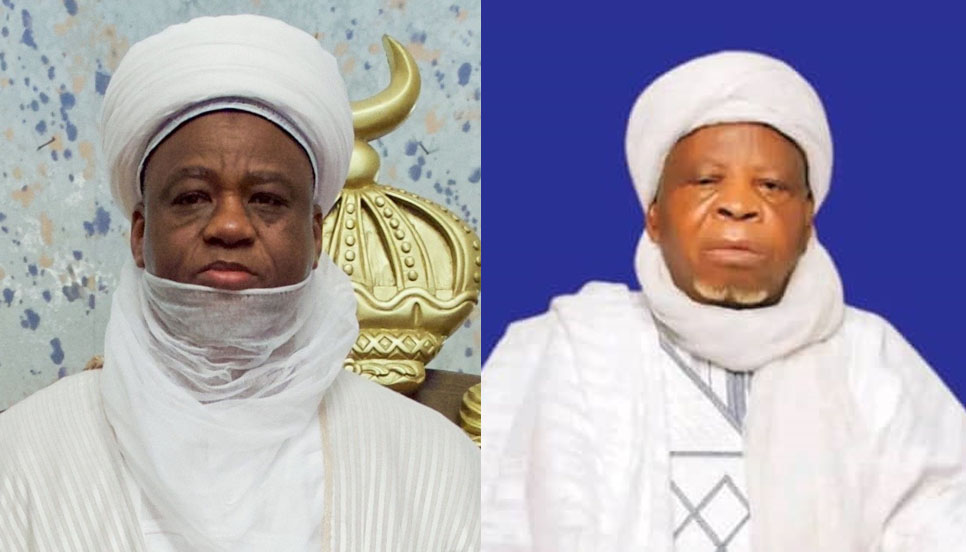
Yoruba Muslim Group Dismisses Viral Ramadan Date Claim, Reaffirms Sultan of Sokoto’s Authority
A Yoruba Muslim group, Concerned Indigenous Yoruba Muslims, has dismissed as false, misleading, and divisive a viral social media report alleging that the Chief Imam of Ibadanland and the League of Imams in Yorubaland rejected the authority of the Sultan of Sokoto in determining the commencement of Ramadan in South-West Nigeria.
The report, which circulated online ahead of Ramadan 1447AH, claimed that Yoruba Muslim leaders had resolved to disengage from the Sultan’s traditional role of announcing moon sighting for the fasting period and instead align with indigenous religious structures. The group, however, said the claim was entirely fabricated and designed to sow discord within the Muslim community.
In a statement issued on Saturday, February 21, 2026 — the fourth day of Ramadan, and signed by public affairs analyst Nasrudeen Abbas, the group said the comments attributed to the Chief Imam of Ibadan, reportedly over 90 years old, could not have emanated from him. It described the publication as a calculated attempt to create unnecessary religious tension and misrepresent the position of Yoruba Muslims.
The group reaffirmed that Islamic affairs in Nigeria operate under established leadership structures, particularly the Nigerian Supreme Council for Islamic Affairs (NSCIA), which is headed by the Sultan of Sokoto, Muhammad Sa’ad Abubakar, as President-General. It explained that the NSCIA structure includes the President of the Muslim Ummah of South West Nigeria (MUSWEN) as Deputy President-General (South), the Shehu of Borno as Deputy President-General (North), alongside other national officers.
READ ALSO:
- FCT Council polls: APC Wins Four Chairmanship Seats as PDP Takes Gwagwalada
- Dangote Opens Refinery Investment to Nigerians With Public Share Sale Plans
- SERAP Urges Tinubu to Repeal ‘Unlawful’ Mass Surveillance Regulations
According to the group, any attempt to distance Yoruba Muslims from this nationally recognised structure threatens the unity of the Muslim Ummah in Nigeria and contradicts Islamic principles that emphasise cohesion, collective leadership, and obedience to constituted authority.
The group also faulted claims that the Sultan’s position is merely a traditional title limited to Sokoto State. It stressed that the Sultan’s authority in Islamic matters is rooted in scholarship and the historical caliphate system, noting that emirs in Northern Nigeria often combine traditional authority with religious leadership. As an example, it cited Muhammadu Sanusi II, who regularly delivers Friday sermons and performs Islamic rites.
It further explained that in Yorubaland, traditional rulers generally do not head religious affairs, except in rare cases. The group referenced the late Awujale of Ijebu Land, who once served as President-General of the Ogun State Muslim Council, stressing that such roles remain exceptions rather than the norm.
The statement also recalled the position of the late Kazeem Yayi Akorede, former President-General of the League of Imams and Alfas in the South West. According to the group, Sheikh Akorede initially questioned the Sultan’s leadership role but later accepted it after clarifications that the position was based on Islamic scholarship and caliphate leadership, not mere traditional kingship. It added that until his death, he consistently aligned with the Sultan’s announcements on the commencement and termination of Ramadan.
Describing the viral publication as unethical, the group criticised claims that Yoruba Muslims are not religiously bound to the Sultan’s authority and that religious leadership should go beyond duties such as moon sighting announcements. It alleged that such narratives were politically motivated and aimed at advancing a separatist agenda under the guise of religious autonomy.
The group warned that politicising religious matters could undermine religious harmony and national unity, urging those behind the report to desist from actions capable of creating discord among Muslims across the country. It concluded by stressing that the unity of the Muslim Ummah in Nigeria remains paramount and must not be compromised by what it described as sectarian or politically engineered narratives.
Yoruba Muslim Group Dismisses Viral Ramadan Date Claim, Reaffirms Sultan of Sokoto’s Authority
News
NNPC CEO Ojulari Receives Prestigious Energy Institute Fellowship in London
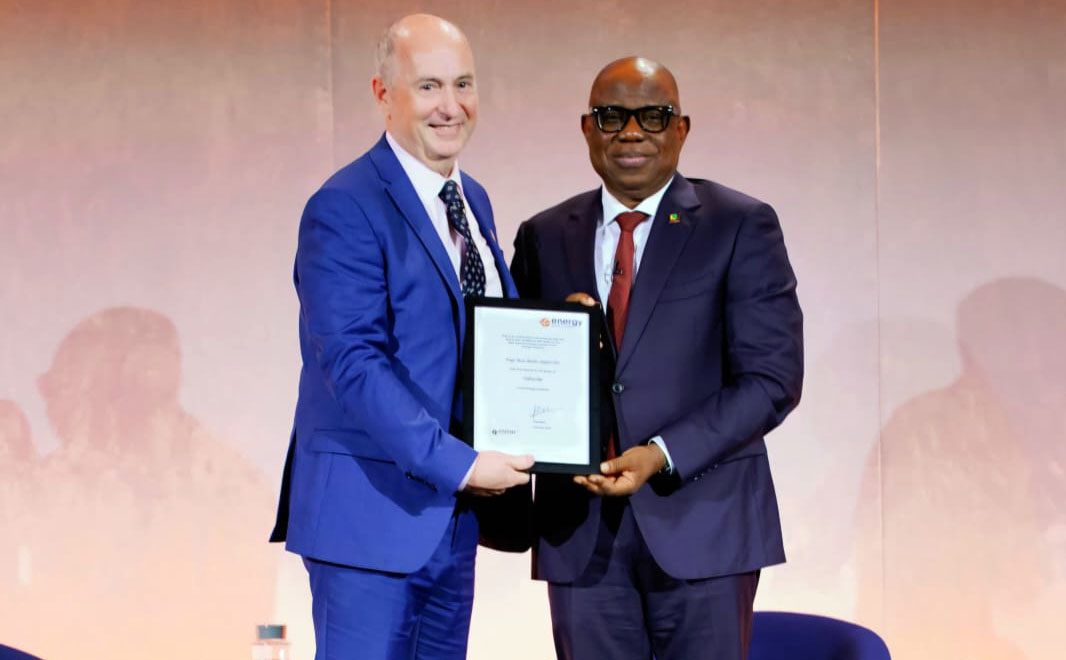
NNPC CEO Ojulari Receives Prestigious Energy Institute Fellowship in London
The Nigerian National Petroleum Company Limited (NNPC Ltd.) has earned international acclaim as its Group Chief Executive Officer, Engr. Bashir Bayo Ojulari, has been conferred with the Fellowship of the Energy Institute (FEI), United Kingdom — one of the highest honours in the global energy industry.
The Fellowship recognises senior energy leaders who have demonstrated sustained, high-impact contributions to the advancement of the energy sector. It was formally conferred on Ojulari during International Energy Week (IEW) in London, a leading platform for energy policy, finance, and industry leadership. (punchng.com)
The honour was presented by Andy Brown, President of the Energy Institute, who praised Ojulari’s transformative leadership of NNPC Ltd., highlighting his role in strengthening governance, embedding a performance-driven culture, and repositioning the company for long-term value creation.
Under his stewardship, NNPC Ltd. has implemented investor-focused reforms, enhanced operational excellence, and expanded strategic global partnerships, all contributing to increased confidence in Nigeria’s energy sector. The recognition reinforces NNPC’s ongoing transformation into a commercially driven, globally competitive, and transparent energy company.
READ ALSO:
- FCT Polls: CSO Situation Room Flags Late Voting, Vote Buying, Logistical Challenges
- ADC Defeats APC to Win First Polling Unit in FCT Area Council Election
- Trump Moves to Indefinitely Suspend Work Permits for Asylum Seekers
Significance for Nigeria and Africa
Experts note that the FEI Fellowship is not only a personal achievement for Ojulari but also a major institutional endorsement of NNPC Ltd.’s reform agenda. Being recognised at International Energy Week, which convenes policymakers, financiers, regulators, and industry leaders, positions the company at the centre of critical global energy discussions on sustainability, energy transition, and capital formation.
The award also signals growing international confidence in NNPC Ltd. and highlights Nigeria’s strategic role in Africa’s energy security and global energy transition ambitions. (vanguardngr.com)
Ojulari’s Leadership Achievements
Since assuming office, Engr. Ojulari has overseen multiple strategic reforms at NNPC Ltd., including:
- Driving governance and operational reforms to boost accountability.
- Expanding strategic partnerships and investor-focused initiatives.
- Enhancing execution efficiency across the company’s subsidiaries.
- Positioning NNPC Ltd. as a credible, investment-ready energy enterprise.
These efforts have not only improved the company’s profitability and performance but also strengthened Nigeria’s energy security and market competitiveness. (punchng.com)
Ojulari described the Fellowship as a reflection of collective effort within NNPC and reiterated his commitment to sustainable value creation, global best practices, and energy sector innovation.
NNPC CEO Ojulari Receives Prestigious Energy Institute Fellowship in London
-

 Business1 day ago
Business1 day agoDangote Opens Refinery Investment to Nigerians With Public Share Sale Plans
-

 Politics3 days ago
Politics3 days agoPeter Obi Launches ‘Village Boys Movement’ to Rival Tinubu’s City Boys Ahead of 2027
-

 Education2 days ago
Education2 days agoUTME: JAMB Clarifies Position on Hijab During Biometric Capture
-

 Politics18 hours ago
Politics18 hours agoTinubu Hails Wike as APC Dominates 2026 FCT Area Council Elections
-

 Education3 days ago
Education3 days agoOgun Gov Rewards Nigeria’s Best Primary School Teacher with Car, Bungalow
-

 Politics2 days ago
Politics2 days agoADC Defeats APC to Win First Polling Unit in FCT Area Council Election
-

 Entertainment3 days ago
Entertainment3 days agoTacha Condemns False Rape Allegations After Mirabel Admits Fabrication
-

 Politics1 day ago
Politics1 day agoOpposition Weakens as Another Governor Eyes APC Move





